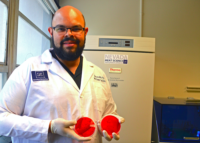A study led by researchers at Pennsylvania State University reveals that paid sick leave laws may be one answer to fewer foodborne illness outbreaks.
According to Penn State’s study, half of all foodborne outbreaks in the U.S. originate at food establishments such as restaurants, and approximately half of those can be traced back to an ill foodservice employee. This is because foodservice workers are still performing their jobs while sick, primarily because they are not entitled to pay if they do not work. Penn State says that only 26 percent of food workers receive paid sick leave from their employers.
The researchers looked at paid sick leave laws in San Francisco and Seattle, scrutinizing how “employee-friendly” they were. Both cities were found to have legislation deemed “more supportive” of employees taking time off when ill. Researchers also evaluated paid sick leave laws in Washington, D.C., and Connecticut, both of which Penn State considers “less supportive” of employees who need time away when sick.
Next, researchers looked at the correlation between paid sick leave laws in each jurisdiction against the rates of foodborne illness (deriving from all sources) in those areas.
Findings indicate that foodborne illnesses decreased in most of the areas that had passed paid sick leave laws.
The research appears to indicate that foodborne illness rates dropped after paid sick leave laws were put in place in areas were laws support employee leave and related benefits.
“What this study tells us is that paid sick leave laws that are more employee-friendly were associated with reduced foodborne illness rates,” says Charleen Hsuan, lead investigator and assistant professor of health policy and administration at Penn State. “However, this decrease was primarily driven by a reduction in infections related to the Campylobacter bacterium, which are more likely to be associated with poor food safety practices, and less with sick food workers. Perhaps the laws reward food establishments that are already conscious of food safety issues. We need more research to understand why these laws were associated with better health."
Hsuan’s co-investigators on this research included Suzanne Ryan-Ibarra and Dawn Jacobson with the Public Health Institute in Oakland, California; and Kat DeBurgh of the Health Officers Association of California.
Penn State’s research findings have been published in the American Journal of Preventive Medicine.




